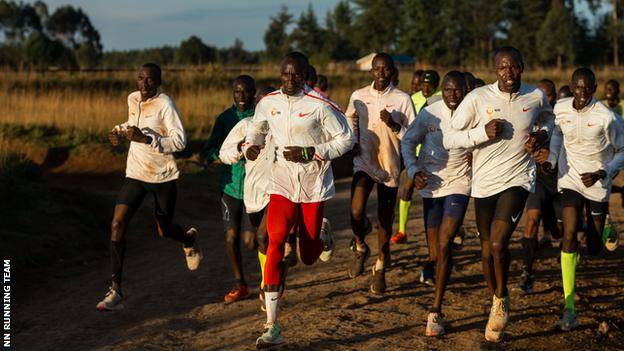This is an excerpt from my book, The Pursuit Of Excellence
Eliud Kipchoge holds the official world record for the marathon at 2:01:39. Of the 13 officially sanctioned marathons that Kipchoge has run, he’s won 11. He is the only known person to ever run the 26.2 miles of a marathon in under two hours (in an unsanctioned event). In the running community, Kipchoge is called “The GOAT” (greatest of all time). Born in Kenya, he was raised by a single mother and only knew his father from pictures. He did not start training seriously until he graduated from secondary school in 1999. So how did a man go from such a humble start to being the best in the world? To find out, I spoke with Alex Hutchinson, a runner, scientist, and the bestselling author of Endure: Mind, Body, and the Curiously Elastic Limits of Human Performance. We spoke at length about Kipchoge and his model of excellence.2 Here are four of the big takeaways I took from our look at the greatness of Kipchoge, captured in the words of the runner himself:
- Discipline = Freedom. “Only the disciplined ones in life are free. If you are undisciplined, you are a slave to your moods and your passions.” I know it feels counterintuitive, but for Kipchoge, discipline is his path to freedom. Some people have the tendency to self-sabotage and let external influences (the media, politics, or other factors outside of their control) impact their work. Staying disciplined and sticking to the plan and the daily process of improvement creates real freedom. Kipchoge’s daily work frees him from the limitations that would bind him, absent that work. The same can be true for you.
- Mindset. “Athletics is not so much about the legs. It’s about the heart and mind.”3 Kipchoge believes that training your mind is equally important to training your body. He told the BBC that “the mind is what drives a human being.”4 Throughout his training, Kipchoge internalizes his goals and cements them as something he truly believes he’s capable of achieving. That belief creates confidence and becomes a self-fulfilling prophecy. He is proof that people can will themselves to improve and perform at high levels.
- It’s about the team. “You cannot train alone and expect to run a fast time. There is a formula: 100% of me is worth nothing compared to one per cent of the whole team. And that’s teamwork. That’s what I value.”5 From the outside, most people view running as an individual sport. Not Kipchoge. His training sessions are always with a team. He surrounds himself with other disciplined runners, trainers, and coaches to help him improve. He understands the value of being surrounded by others who lift him up. It is notable that he celebrates the excellence of his friends. When one of his training partners, Geoffrey Kamworor, won the New York City Marathon, Kipchoge was there at the finish line to congratulate him. Kamworor would later share that he was motivated by Kipchoge’s presence at the finish line. “I knew my training partner and mentor Eliud was waiting at the finish. I was concentrating because I did not want to disappoint him.”
- The results take care of themselves. “To win is not important. To be successful is not even important. How to plan and prepare is crucial. When you plan very well and prepare very well, then success can come on the way. Then winning can come on your way.”6 Kipchoge’s sole focus is on his process to improve. The results take care of themselves. A look at his marathon times reveals that even as he approaches the age to be considered a “Masters athlete,” Kipchoge is getting faster. He’s improving. He’s not focused on others. He’s focused on continually improving himself. He cares more about his own personal best times than other runners’ records. He’s always striving to break his own personal records, not those of others. Kipchoge is a prime example of someone who came from a modest background and worked to become the best in the world at what he does. While it may be easier for some than for others, it is possible for all of us. The potential for excellence is within all of us. The ones who achieve it and sustain it are intentional about their daily, disciplined process to make it happen. Those who, like Kipchoge, focus on the heart, the mind, and the continuous process to improve can create real freedom.


“Athletics is not so much about the legs. It’s about the heart and mind.”3 Kipchoge believes that training your mind is equally important to train your body.
Love each word of this article. The above sentence stands out for me. Thanks for sharing.